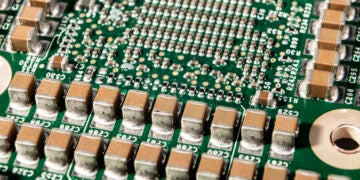When creating a PCB design, many designers are now using 3D models of their components in the process. Although the PCB design is created in 2D, designers are often looking at the design of the whole product rather than just their portion of the design—turning to the usefulness of 3D models for verification and accuracy purposes. Accuracy is key when designing a board and with the advance of technology, design requirements are becoming tighter and more stringent than ever. 3D models can add security and peace of mind that the board design is going to be functional before ever making it to the manufacturing floor.
One of the most common reasons a designer chooses to use a 3D model in their PCB design is for verification purposes. 3D models are especially useful for checking clearances and alignment on complicated components like connectors. Using a 3D model can also be helpful when placing component silkscreen and reference designators to ensure an accurate placement, with no overlapping. When used, a 3D model can give instant visual feedback to the designer and indicate whether or not a design is viable. The 3D model can also show the designer how the board is going to look physically and show how the board fits in the housing. This visual, or even automated check, allows designers to avoid costly manufacturing mistakes by giving a preview of what the physical board will look like once produced and increases the integrity of the design. Increasingly, 3D models can be used when setting up assembly processes, such as special placement requirements for assembly tooling.
Although board verification is often the main use for a 3D model of a 2D design, there are other uses as well. By having your design in a 3D format, a designer can easily collaborate with mechanical engineers to produce the most efficient board possible. A designer who is familiar with 3D models can animate their design to show manufacturers exactly how to install the board or maintenance people how to test, repair, and replace it. Designers can also use 3D models to mock up different design layouts for complicated boards to determine what is the most efficient and accurate placement of components.
With 3D models becoming a key part of the design process, the issue arises of where to find accurate 3D models. Some manufacturers provide 3D models of their components, but this is not an industry standard yet. Ultra Librarian has over 85% 3D model coverage of our 12 million component library. Our 3D models are dynamically created, so they can automatically scale to whatever changes you make to your component. Also, because our models are dynamically created, they do not require additional effort to align & rotate—they will align to footprints by default. Try a 3D model from Ultra Librarian today for free at www.ultralibrarian.com.








